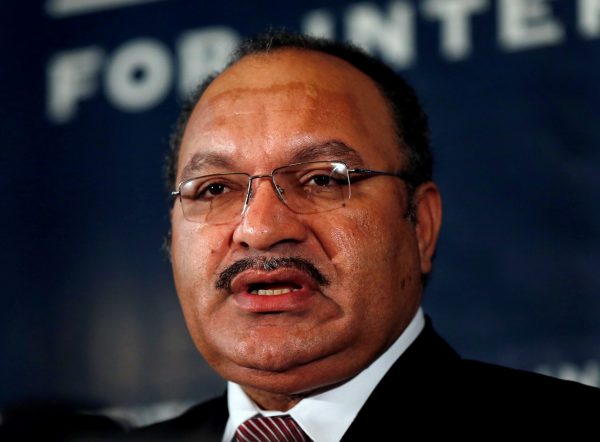, and the sustainability of Prime Minister O’Neill’s bankrolling tactics.
In May 2016, a five week strike by university students called on O’Neill to resign over corruption and misgovernment allegations. Then in June, police shot at students marching to lobby parliament. After years of parliament not even considering attempted motions of no confidence, the Supreme Court ruled in July that the government must be held accountable. O’Neill survived the 22 July vote of no confidence 85 to 21, after allegedly dispersing district funds totaling many millions of kina through members of parliament (MPs).
O’Neill was expanding a pattern set by Sir Michael Somare of a government largely based on allocating billions of kina each year to districts, funds which have contributed to PNG’s fiscal crisis. Unfortunately these funds — which MPs effectively control — have little positive impact on essential services.
The government acknowledges there is corruption but it’s not fighting it hard. The Police Fraud Squad director has estimated that in 2016 complaints of official fraud totaled 1.5 billion kina (US$472 million). Across the country, social media analysts have spread details of collapsing government services and corruption.
O’Neill’s parliamentary dominance failed to stop the Opposition’s critiques of corruption. Former prime minister and treasury secretary Sir Mekere Morauta is so alarmed by corruption and economic mismanagement that he is standing for parliament again, warning of O’Neill’s ‘octopus with many tentacles, invading every crevice, every nook and cranny where there is the smell of money’.
Recent trends indicate that the huge task of managing frenetic elections could overwhelm the state’s limited budget, administrative capacities and undisciplined and too often trigger happy security forces. The Electoral Commission and police are both underfunded. MPs can dominate their districts’ bureaucracies and influence both the voter enrolment processes and electoral administration, which in turn can bias outcomes. Detailed election observations report high levels of ‘money politics’, intimidation and — especially in 2002 — post-election violence. While the Electoral Commission has drawn up a code of conduct, it has been signed by only eight of the 45 registered parties.
PNG’s political and social fragmentation is notorious and every election has resulted in multi-party coalitions. Constitutional rules almost inevitably determine that the prime minister will come from the party with the most endorsed candidates elected and that they will form a multi-party coalition. O’Neill’s People’s National Congress led after the 2012 election and then used funding to attract other parties, while allegedly starving out Opposition MPs. The largest category elected in 2012 were the non-party independents — some of whom were concealed nominees of major parties — who mostly joined the richest bandwagon.
PNG’s political parties have trouble working together. The current Opposition is made up of three main parties with leaders who had all either resigned or were sacked from O’Neill’s ministry. As Somare’s National Alliance found in 2011, political loyalty can be unreliable.
In April this year, the current National Alliance Party leader and Treasurer Patrick Pruaitch bitterly attacked O’Neill, saying that under O’Neill’s economic management PNG has ‘fallen off a cliff’. In response O’Neill said Pruaitch’s position was ‘untenable’ yet he kept him on as minister without portfolio. On 16 May the National Alliance party quit O’Neill’s government, making Pruaitch a direct rival for the premiership. Government wastage and impoverished services are the most salient election issues nationally and there are signs O’Neill feels vulnerable. Loi Bakani, Central Bank Governor, has asked candidates to refrain from comment on the economy.
Competition will be intense in this upcoming election, as candidates seek renown for themselves, their village or clan. There will be 3332 candidates contesting a total of 111 seats, including 165 women — just shy of the 2012 record of 3343 candidates. Extreme localism combined with widespread malfeasance can bring an apparent randomness to election outcomes. An average of over 60 per cent of sitting MPs lost out in the last three elections and current MPs will be nervous.
Candidates usually campaign on similar local issues — roads, bridges, schools and health services — and complaints against the incumbent. Yet trust is lacking and hopefuls rarely coordinate to achieve a common goal. Women candidates hoping to break gender barriers must try to bridge kinship groupings and need a demonstrable record of delivering benefits to potential voters. Only three of the 135 women candidates were elected in 2012.
International issues will have little salience in this election, although resentment towards the economic presence of Chinese small businesses is growing. PNG will host APEC in late 2018 but O’Neill’s extravagant APEC-related infrastructure investments in the capital have served to weaken his key programs on school education and health services.
While the Regional Processing Centre for asylum seekers on Manus Island has hurt PNG’s image internationally, it has barely received any attention domestically. O’Neill agreed with Australia’s then Rudd government in 2013 to resettle refugees, but he now speaks against it. The asylum seekers and refugees fear community hostility and PNG’s current move to close the centre will embarrass both governments.
The Australian government surely knows the O’Neill government’s weaknesses but its officials seem to prefer him to any other candidate. Morauta has complained that Prime Minister Turnbull’s visit in April 2017 could be seen as support for O’Neill. This Australian factor echoes the 2002 election when Somare’s belief that the Howard government had wanted Morauta to retain power created a legacy of resentment that lasted until the parliament removed Somare from office in 2011.
While the constitutional rules of the game will favour the largest party in the house, only a brave observer will predict the outcome of PNG’s upcoming election.
Bill Standish is an Honorary Senior Lecturer at the School of Culture, History and Language in the College of Asia and the Pacific at The Australian National University. He has observed seven national elections in PNG.

